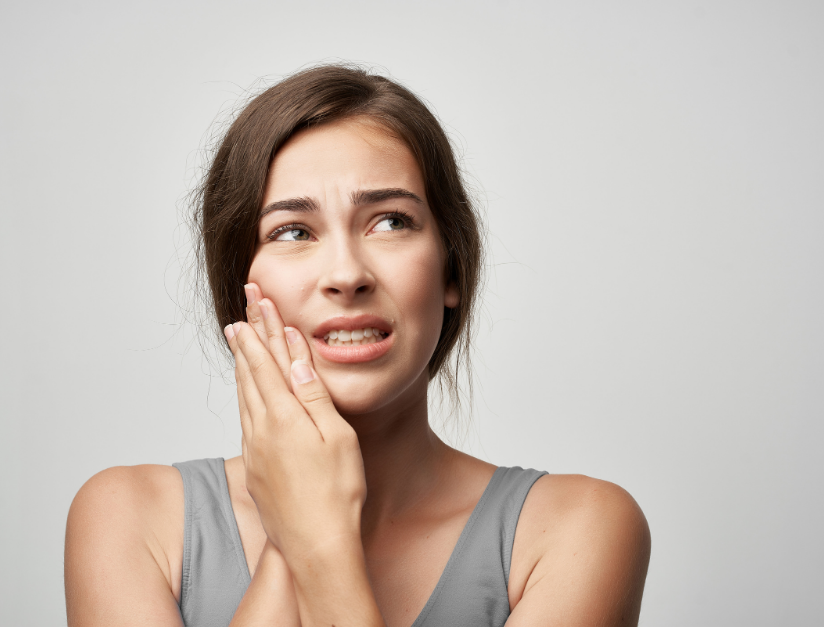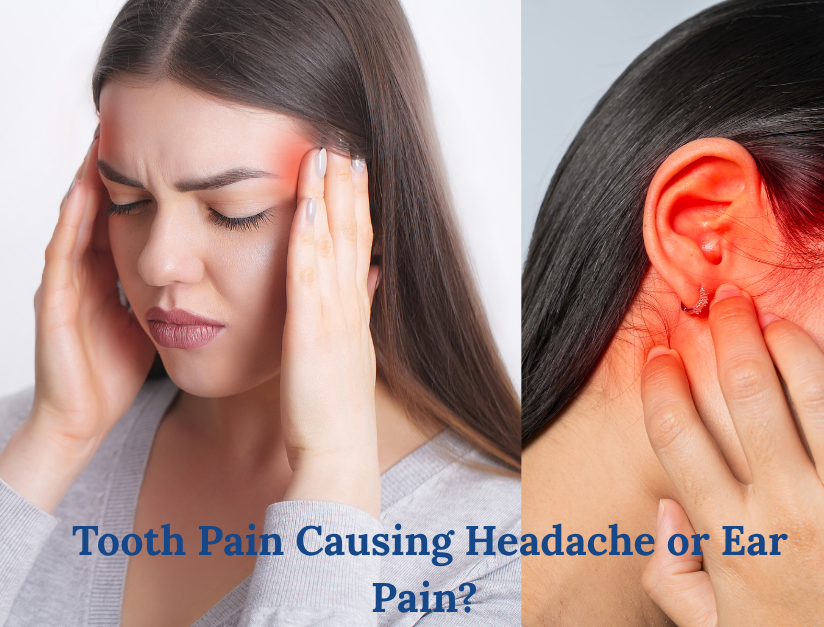It starts with a simple toothache. Then suddenly, you notice a throbbing headache or even pain radiating near your ear. If this sounds familiar, you’re not alone. At Royal Oral & Dental Clinic in Kanpur, we often meet patients who don’t realize that their dental problems might be the hidden cause behind their headaches and ear discomfort.
So, can a tooth problem really cause a headache or ear pain? The answer is: Absolutely, yes. Here’s how—and what to do about it.
How Can a Toothache Lead to a Headache?
The human face is an intricate network of nerves, muscles, and tissues that are all connected. When one part becomes irritated—like a tooth nerve from decay or infection—the pain can travel or “refer” to other areas, such as your head or temples.
This is often called referred pain. The most common dental issues that can trigger headaches include:
- Cavities (Dental Caries)
- Infected or impacted wisdom teeth
- Tooth abscess or gum infection
- Bruxism (grinding or clenching teeth)
- Temporomandibular Joint Disorder (TMJ/TMD)
👉 Common Symptoms:
- Constant dull ache behind the eyes or temples
- Sharp pain when biting or chewing
- Pain worsens when lying down or at night
- Tooth pain that radiates to the side of the face

Can Dental Problems Cause Ear Pain Too?
Yes, they can. This is another form of referred pain, where discomfort from the teeth or jaw affects nearby areas like the ears.
Here’s how it happens:
- Jaw Joint (TMJ) Misalignment: This joint sits right near the ear. If your bite is off, it can cause pain and even clicking noises in your ear.
- Wisdom Teeth Eruption: Impacted wisdom teeth can cause swelling and pressure near the ears.
- Severe Tooth Infection: Infections that reach deep tooth roots or jawbone can trigger earaches, headaches, or swollen lymph nodes.
Real-Life Example from Kanpur
At Royal Oral & Dental Clinic, one of our recent patients—Mrs. Sharma from Kidwai Nagar—came in with a persistent headache and ear pain. She had been taking painkillers for weeks, thinking it was a sinus or migraine issue. Upon examination, Dr. Deepesh Gupta identified a deep molar cavity that was pressing against the nerve. A painless root canal resolved the issue, and her headache disappeared within days.
When Should You See a Dentist?
If you experience headaches, earaches, or facial pain that don’t respond to medication—or if they are accompanied by tooth sensitivity, bad breath, or jaw pain—it’s time to see a dentist.
Especially if you notice:
- A constant dull headache near one side
- Pain that worsens when chewing
- Swelling in your gums or jaw
- Tooth pain affecting your ear and head
These may be signs of:
- Tooth infection
- TMJ disorder
- Impacted wisdom teeth
- Gum abscess
How We Help at Royal Oral & Dental Clinic
Dr. Deepesh Gupta and our expert team in Kanpur use advanced dental diagnostics to identify the root cause of your pain. Our services include:
- Digital X-rays to pinpoint hidden infections
- TMJ evaluation and bite alignment
- Root canal treatments with no-pain techniques
- Wisdom tooth extractions
- Gum care and infection management
We don’t just treat symptoms—we fix the source of the problem to give you lasting relief.
Tips to Prevent Dental-Related Headaches
- Brush twice a day and floss daily
- Avoid clenching or grinding your teeth
- Use a mouthguard if you grind your teeth at night
- Don’t delay treatment for cavities or gum pain
- Visit your dentist every 6 months for preventive care
Visit the Best Dentist in Kanpur for Headache or Ear Pain Relief
If you suspect your headache or ear pain might be dental-related, don’t wait. Early diagnosis can save you from complications like infections, abscesses, or even tooth loss.
Royal Oral & Dental Clinic, led by Dr. Deepesh Gupta, is trusted across Kanpur for compassionate and precise dental care. Let us help you live pain-free again—with a healthy smile.

Frequently Asked Questions (FAQs)
1. Can a toothache really cause a headache?
Yes, it can. A toothache—especially from an infected or decayed tooth—can irritate nearby nerves and cause referred pain in the head, leading to tension-type or even migraine-like headaches.
2. Why does tooth pain spread to my ear or head?
Tooth pain can spread due to the close connection between the trigeminal nerve and surrounding facial areas. Dental infections, TMJ problems, or impacted wisdom teeth can easily cause ear pain, jaw pain, or headaches.
3. What dental conditions can trigger headaches or ear pain?
Common dental causes include:
- Cavities and tooth decay
- Impacted wisdom teeth
- Infected gums or abscess
- TMJ disorder
- Teeth grinding (bruxism)
4. How can I tell if my headache is dental-related?
If your headache is accompanied by:
- Jaw or tooth pain
- Pain while chewing
- Swollen gums or face
- Pain that worsens at night
…then the source may be dental. A dental checkup can confirm it.
5. Can dental infections affect my overall health?
Yes. Untreated tooth infections can spread to other parts of the body and may lead to serious complications like fever, swollen glands, or sinus issues. That’s why early diagnosis and treatment are critical.
6. What treatment options are available for tooth-related headaches?
Treatment depends on the cause:
- Root canal for infected teeth
- Extraction for impacted wisdom teeth
- Night guards for teeth grinding
- TMJ therapy for jaw misalignment
- Scaling & cleaning for gum infections
At Royal Oral & Dental Clinic, Dr. Deepesh Gupta will guide you with the right treatment.
7. Is it normal to get a headache after dental procedures?
Mild headaches can sometimes occur after tooth extractions or root canals, especially due to anesthesia wear-off or jaw tension. It usually subsides within 24–48 hours. If it persists, consult your dentist.
8. How do I prevent tooth-related headaches in the future?
- Maintain excellent oral hygiene
- Avoid clenching or grinding your teeth
- Don’t skip routine dental checkups
- Get cavities treated early
- Wear a mouthguard if prescribed
📞 Call Now: [+91 90268 02954]
📍 Location: [Kidwai Nagar, Kanpur]
🌐 Book Online: [https://drdeepeshgupta.com/]

